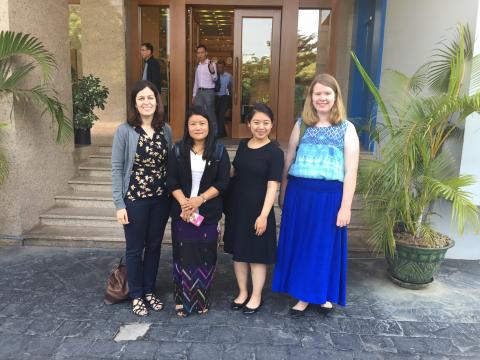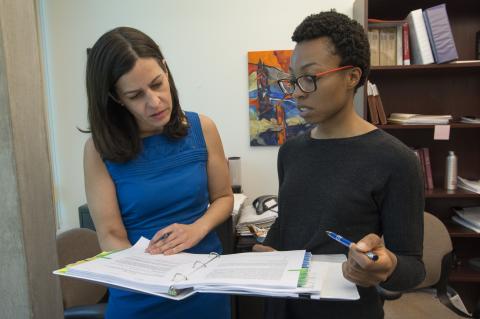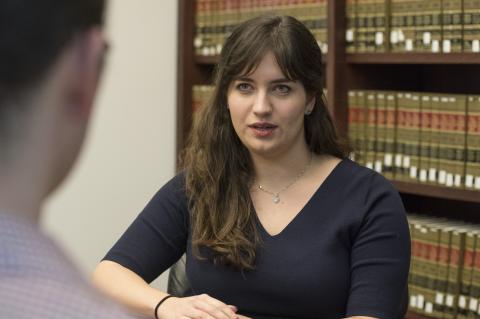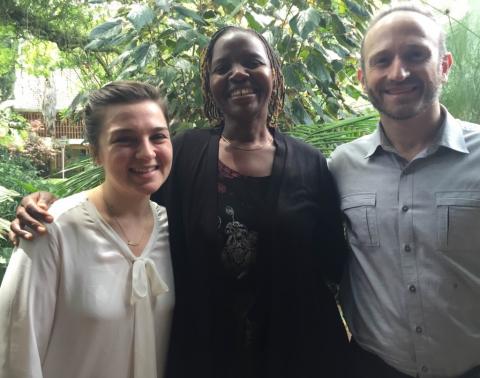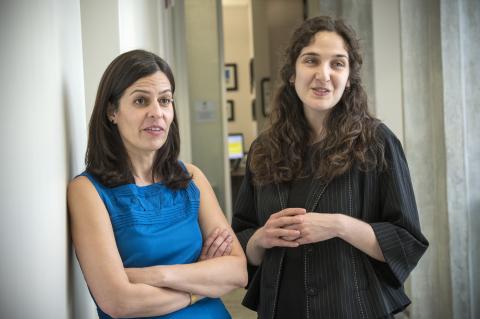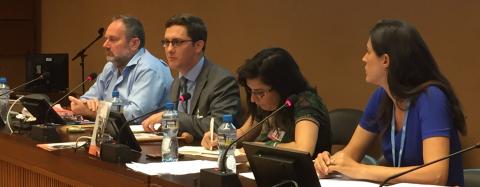In Pursuit of Global Justice
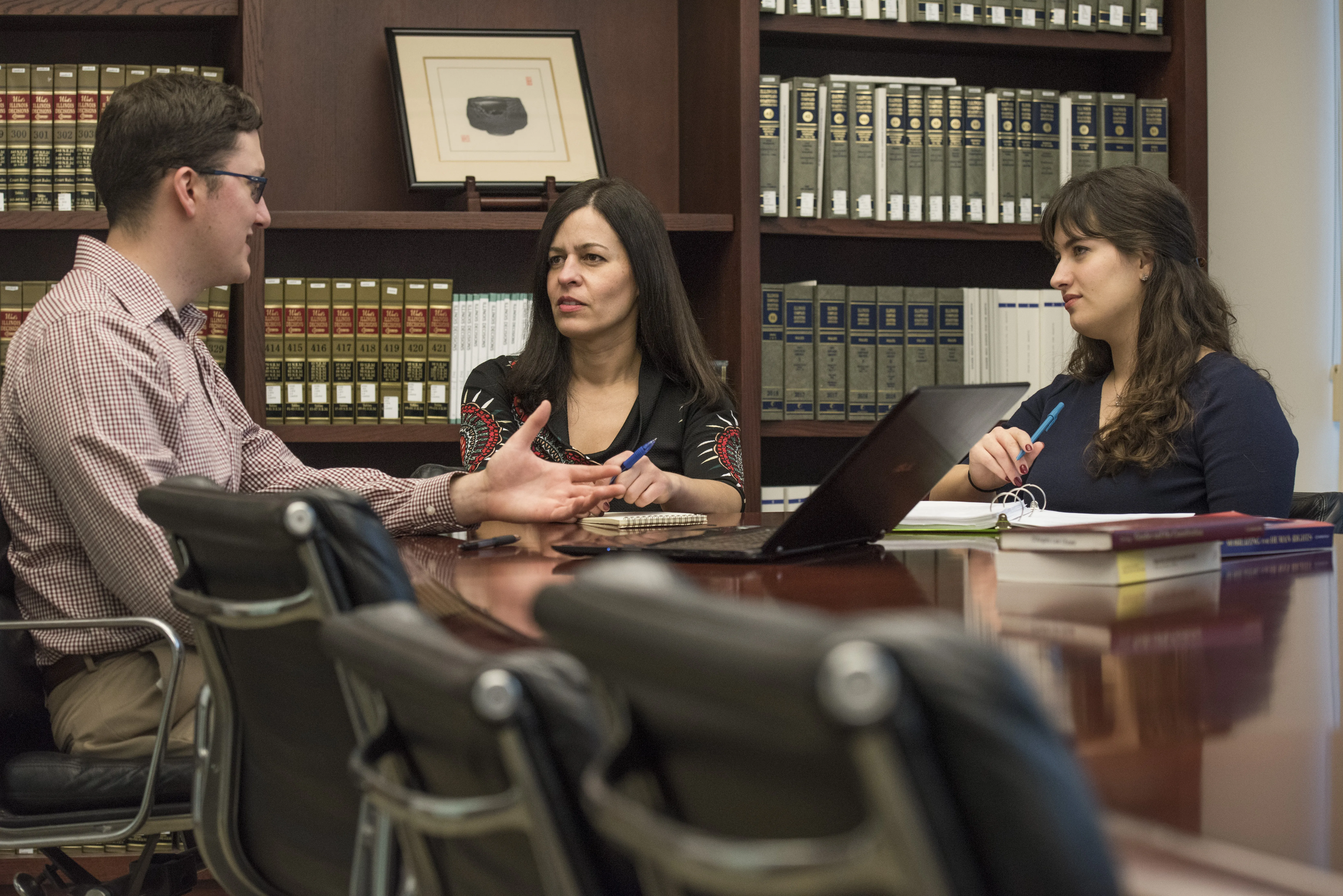
One day last summer, Aaron Tucek, ’19, sat before members of the United Nations Human Rights Council in Geneva, Switzerland, his heart pounding as he prepared to make the most of the next 10 minutes. He and two classmates in the Law School’s International Human Rights Clinic had spent months examining how police tactics can either protect or undermine the rights of protesters. They studied law enforcement policies and practices from around the world, reviewed international legal principles, and traveled abroad—Tucek to Northern Ireland, the other two to England—to interview police chiefs, activists, and policing experts. For weeks, they devoted themselves to writing and revising their report, running draft after draft by Clinical Professor Claudia Flores (the director of the human rights clinic) and Nino Guruli (the clinic’s fellow and a lecturer in law). By late spring, the team and their partners—civil liberties organizations from Canada, Argentina, and other countries—had produced a 113-page report, Defending Dissent: Towards State Practices that Protect and Promote the Rights to Protest, that identified 12 core principles and 33 best practices aimed at balancing free speech and public safety.
Now, seated beside two of their partners in a conference room at the Palace of Nations—the UN’s home in Geneva—Tucek was set to share the fruits of this labor with UN officials and other human rights experts at a side event during the Human Rights Council’s 38th Session.
Public speaking was not new for Tucek. He had participated in debate in high school and Model UN in college, but this wasn’t like anything he had ever experienced. He and his classmates, Brittany McKinley and Eleni Christou, both ’19, had synthesized a staggering amount of information, and now, as the one chosen to represent their group in Geneva, he needed to communicate the key points in less time than it takes to walk across the University of Chicago campus. It was work he loved, though, and a day he knew he would remember.
“Human rights is something I’ve been passionate about for a very long time,” he said. “And police reform in particular is something I care about—the interaction between police and people out in society is really where the rubber meets the road in terms of the civil rights and civil liberties.”
Tucek took a deep breath and began to speak.
***
There is a word students often use when they talk about the International Human Rights Clinic: empower. And not just because the work is built around acknowledging human dignity, advancing global justice, and protecting basic rights, but because the clinic’s pedagogy is based on the idea that students learn best when they feel empowered to pursue the work themselves.
Flores is deeply involved in each of the clinic’s projects—between three and six a year—but it’s the students who sift through hundreds of pages of research, write reports, and conduct interviews all over the world with activists, government officials, NGOs, and even those who have experienced discrimination or abuse. Students say it can be overwhelming at first, being asked to map out a strategy with classmates whose experience is as limited as yours, or to speak up when you are still trying to wrap your brain around an issue, or to picture yourself six months in the future, delivering a finished project to the client.
“At the end of first quarter, all of the students feel completely out of their depth,” Flores said. “And that’s okay.”
Students meet regularly with their own team, as well as in a big group with students on the other projects. Flores and Guruli ask questions and offer guidance, but they are more likely to push students to reflect than to hand them a solution.
“I truly feel that Claudia and Nino not only want our opinions, they value them,” said Leena El-Sadek, ’20, who is part of a project examining prison labor programs. “And because of that, I’m motivated to look inside of myself, to confront my own judgments and values—and maybe articulate that in a legal argument. It’s so much responsibility, but what they’re doing is mimicking the real world as much as possible while giving us the direction that we need as future practitioners.”
Flores, a well-traveled human rights lawyer who has worked with the United Nations, the American Civil Liberties Union, and the American Center for International Labor Solidarity, joined the Law School’s clinical faculty in 2015, taking over the human rights clinic founded in 2012 by former Law School Clinical Professor Sital Kalantry. In the past four years, Flores has built upon the clinic’s founding mission, bringing in a mix of litigation, advocacy, and legislative projects that span an array of issues and involve a variety of countries. She keeps a steady eye on achieving two core objectives: teaching students to approach human rights work in a thoughtful and sustainable way, and equipping them with a set of general lawyering skills that will serve them regardless of the practice area they choose after graduation. She places a particular emphasis on good writing, group work, interviewing, and client engagement.
“The experiences in the clinic were incredibly substantive and hands-on,” said Nabihah Maqbool, ’18, who was part of the International Human Rights Clinic for two years and is now a fellow at the national civil rights organization Muslim Advocates. “I’m really grateful because it [enabled me] to dive into projects during my fellowship. Professor Flores does such a great job of empowering the students, reminding them that they are capable of achieving the project’s end goal. We learned to productively navigate the needs of the client and the dynamics of the team, as well as shifting priorities and timelines.”
Human rights is a relatively young area of international law, emerging in its modern form in 1948, when the United Nations adopted the Universal Declaration of Human Rights (UDHR). The declaration—one of the world’s most translated documents—articulated global standards for the protection of fundamental rights, inspiring legally binding international treaties and playing a key role in advancing human rights efforts around the world. It is a complex and evolving area of law, one shaped by social norms, economic development, and shifting politics. But, in some ways, it is also simple in its mission—to protect humanity’s most basic needs and values—a fact that hooked Flores early in her study of law.
“I was drawn to this work in part because human rights principles get more directly at what I think our social justice fabric should really look like,” Flores said. “Constitutions are protective, but they’re uneven, and I think the human rights framework provides the foundation for the way that we should be treating each other and what the individual should expect from the government and the nation-state.”
In recent years, the International Human Rights Clinic has taken on urgent, heartbreaking, and sometimes controversial issues, teaming up with organizations like the ACLU, Oxfam, and the United Nations Entity for Gender Equality and the Empowerment of Women (UN Women). Students have studied violence against female farmworkers in Mexico; child trafficking and forced labor on cocoa plantations in West Africa; violence against women in Pakistan; land restitution and workers’ rights issues in Myanmar; the impact of constitutional reform on women’s rights in Morocco, Vietnam, and other countries; and violent extremism in Tunisia, Kenya, and the United States. They have applied international human rights standards to domestic issues, too, studying the use of lethal force in policing and the impact of solitary confinement in US prisons.
Last year, Maqbool and classmates Grace Paek and Chinwe Chukwuogo, both ’18, worked with the ACLU’s Border Litigation Project on an explosive report documenting complaints of abuse reported by unaccompanied immigrant children who had been detained while trying to enter the US at the southern border. The ACLU obtained the records, which covered a five-year period during the Obama administration, through Freedom of Information Act litigation. In those complaints, migrant children described being kicked, shot with Tasers, sexually assaulted, deprived of food and water, held in freezing and unsanitary detention centers, threatened with rape and death, and verbally abused by US Customs and Border Protection officials. The report offered evidence that the government had failed to investigate adequately. (After the report’s release, the Department of Homeland Security denied the claims, saying that the children’s allegations were “baseless.”)
The work attracted national media attention, and Maqbool joined Flores and ACLU attorneys in speaking to reporters. Maqbool had spent nearly two full academic years in the clinic by then, and Flores had seen her navigate complicated issues and take on difficult tasks, fueled by a dedication to civil rights.
“Nabihah was a superstar—she was really amazing,” Flores said, thinking back on the interviews several months later. “We have a lot of students like her who they know what they want, what they’re passionate about, and where they’re going to go. And even those who don’t know develop it over time.”
***
There is much, in fact, that develops over time in the International Human Rights Clinic.
Despite tight timelines and heavy workloads, patience is essential. A rushed interview might cause a student to miss critical information, and a rushed conclusion might prevent valuable insights or lead a student off course.
“There’s a certain amount of humility that I think really good lawyering requires,” Flores said. “If you go into an interview with any client and you think you know everything already, usually you’re going to end up in a pretty ineffective place.”
Thorough and productive human rights work requires layers of context and understanding, Flores tells students— and those layers take time to accrue, especially when other languages, cultures, and social norms are involved.
Students might start by studying the applicable law within a particular country, but they often also need to understand how history, economics, politics, culture, and the day-to-day realities of life factor in—as well as how the issues and laws fit the international human rights framework.
Christou remembers feeling intimidated when she joined the clinic as a second-year student. There seemed to be a vastness to what she didn’t yet know, and it was hard to imagine producing a comprehensive report in just a few months—although she knew that they would, somehow.
“None of us really knew where to start,” said Christou, who is working on immigrants’ rights and Nigerian police reform in the clinic this year. “But in the end it was rewarding—we came out of it knowing a lot more than if Claudia and Nino had just told us what to do. We had to consider all angles, and why we were doing certain things, and what we hoped to get out of a particular approach.”
Typically, themes begin to emerge during second quarter—and new levels of understanding snap into place when students travel abroad, as many do, over spring break. In-person interviews tend to bring issues into focus; students often come home with new, more nuanced perspectives.
Kaitlin Beck, ’17, felt that way three years ago after a trip to Zimbabwe. She had spent months researching the impact of constitutional reforms on issues of marriage, housing, domestic violence, and gender equality. But it wasn’t until she met Zimbabwean women, observed the culture, and spoke face-to-face with activists that she began to understand that legal reform wasn’t always enough, especially when powerful social norms were at play. On some issues, including child marriage, real change would require awareness campaigns to win over the hearts and minds of citizens.
The same thing happened the following year when Beck and Vera Iwankiw, ’17, traveled with Flores to Tunisia to study violent extremism. There was a striking tension, they learned, between security efforts and human rights— one that hadn’t been readily apparent from the desk research. Domestic violence advocates often pushed for the punishment of female radicals—even knowing that many were coerced into joining extremist groups—and frightened citizens often seemed willing to trade fundamental protections if it meant stamping out brutality.
“We were able to hear people talk about their firsthand experiences, which are often lost when you read a news story reporting on a global trend,” Iwankiw said in 2017, shortly after she returned from Tunisia. “And one thing we got a sense for is how scared people are. It’s different when you hear them talk about it.”
Flores enjoys witnessing the students’ progress—the gradual accumulation of knowledge that tips into comprehension and, finally, vision. At the beginning of the year, she tries to reassure them that the knowledge will come.
“Everyone feels this way at the beginning,” she says. “You just have to do the work. You’ll get there.”
She knows from experience: this is just the way big projects unfold.
“There are stages to understanding things,” Flores said. “And I’ve now been doing this long enough that I recognize each one.”
***
Early in her career, Flores used to say that she would probably end up running a human rights clinic at the University of Chicago. The thought of someday returning to her undergraduate alma mater felt natural: the values fit her own, and she could see herself running a clinic.
“I’ve always had so much love for this university,” said Flores, who earned a bachelor’s degree in philosophy in 1997. “It’s a special educational environment—there’s a passion for discourse and ideas and for the tough job of confronting thoughts that are different from your own. If you’re in a place where everyone agrees with you, your ideas become stagnant.”
Flores attended New York University School of Law, where she earned a prestigious scholarship awarded to high-achieving students who demonstrated a commitment to public service and a potential for leadership. She also earned a Skadden Fellowship and, after law school, spent two years directing a project aimed at helping immigrant household workers who had been trafficked or denied wages by their employers, many of whom were foreign diplomats entitled to immunity. Flores argued that the United States has an obligation to protect these workers under the American Declaration on the Rights and Duties of Man, a human rights document adopted by nations of the Americas in 1948, a few months before the UN adopted the UDHR. The case dragged on for years—and, last year, the State Department issued a response to her original petition. Now, some of Flores’s students are working on a reply.
In the years that followed her Skadden Fellowship, Flores traveled the world, serving victims of human trafficking in Indonesia, fighting for women’s equality in East Timor, and helping incorporate human rights principles into the national constitution in Zimbabwe.
When the opportunity emerged to lead the Law School’s International Human Rights Clinic in 2015, Flores was already back in Chicago, practicing civil rights and constitutional law as a partner in a law firm. She was excited to lead the relatively young clinical program, helping teach essential skills of lawyering by working in a field she loved—and doing it alongside new colleagues who would challenge and support her.
“I found a dynamic clinical environment where there’s a lot of creativity and innovation about how to approach clinical work,” she said.
Brian Citro, ’10—who had served as the acting director of the International Human Rights Clinic for several months in 2015 after another acting director, Carrie Bettinger-Lopez, left—helped Flores run the clinic as associate director until 2017. Guruli, fresh from a PhD program, arrived later that year.
Human rights and international law had long been an area of interest for Guruli. She’d been fascinated by just war theory as an undergraduate at Mount Holyoke. In law school at Notre Dame, she had worked as a research assistant for a professor who focuses on international humanitarian law. Before starting her doctorate in comparative law and national security at the University of Cambridge, Guruli had worked with the Office of the Prosecutor at the International Criminal Tribunal for the former Yugoslavia and the Office of the Prosecutor at the Special Tribunal for Lebanon.
The two-year fellowship in the International Human Rights Clinic offered her an opportunity to combine teaching, course development, research, and fieldwork— exactly what she needed as she figured out which aspects of human rights advocacy to pursue.
“I can’t imagine any other experience that would allow me to do so many different things all at once, right after the PhD,” she said. “Claudia is such a wonderful mentor—incredibly generous and unbelievably capable in every aspect of human rights advocacy and teaching.”
Guruli and Flores are a good complement, with Guruli tending to focus on theory and Flores leaning toward practical applications.
“Nino gets excited about the nuances of the legal arguments that we’re making, and I’m more likely to be thinking, ‘What’s going to convince the judge?’” Flores said. “It’s an important consideration when hiring for the fellowship position—you don’t want to just reproduce yourself, you want to bring in someone who’s going to complement and round out the mentorship and supervision we provide the students.”
Flores and Guruli model collegiality for their students, emphasizing the importance of group work and encouraging students to hone the skill.
“There’s a huge amount of collaboration in the legal field,” Flores said. “Student life can be very individual. You’re turning in your assignments, you’re taking your own classes. It is important to figure out how to work with people with different strengths, weaknesses, and skill sets.”
Christou remembers learning to fit those pieces together while working with Tucek and McKinley on Defending Dissent, the policing protests project. Tucek’s strength was understanding theory, and McKinley did a great job analyzing social and historical aspects. Christou excelled at practical applications.
“Not only were we learning how to do international human rights legal work, we were also learning how to deal with group dynamics—setting and meeting expectations and being a part of a team,” Christou said. “I couldn’t expect Brittany and Aaron to approach things the way I would or that their work product would look exactly the way mine looked. Once we learned more about each other, we were able to figure out which part of the project each of us should handle to capitalize on those strengths.”
***
By the time Tucek left for Geneva to present the policing protests report, he and his classmates—not just on his team but across all of the projects—had grown confident and knowledgeable, just as Flores had told them they would.
One group was working on a report documenting violence and discrimination against female farm workers in Mexico; the initial findings were used by an advocacy group working to persuade US fast food companies to take responsibility for abuse in their supply chains.
The project on unaccompanied immigrant children had raised awareness about conditions in detention facilities just as family separations were attracting national attention.
And Tucek had arrived at the Palace of Nations poised and prepared.
“He gave this incredibly composed, lucid, and passionate presentation that I think everybody was just completely floored by,” Flores said.
Months later, he reflected on the progress he’d made over the course of the year, remembering how tough the first interview in Belfast had been and how he had relied on Guruli for support.
“As we did subsequent interviews—in Northern Ireland and over Skype when we got back—I became more confident,” Tucek said. “It makes a difference to come in very prepared so you can have an intelligent conversation with the person across from you.”
Guruli had seen how much Tucek and many of his classmates had grown since fall quarter; they had worked for it, and it was nice to see them succeed.
“I’m always impressed with how much our students are willing to do, and in such a short period of time,” she said. “It’s incredible to see how professional, how committed, and how passionate they are through the whole process.”
Looking back, Christou is certain that the clinic—and its rigorous process—taught her things that will make her a better lawyer.
“I’ve learned so much about the practical side of things, and I think that will serve me well,” said Christou, who will work at DLA Piper after graduation.
“Nothing,” she added, “is a substitute for real experience.”
